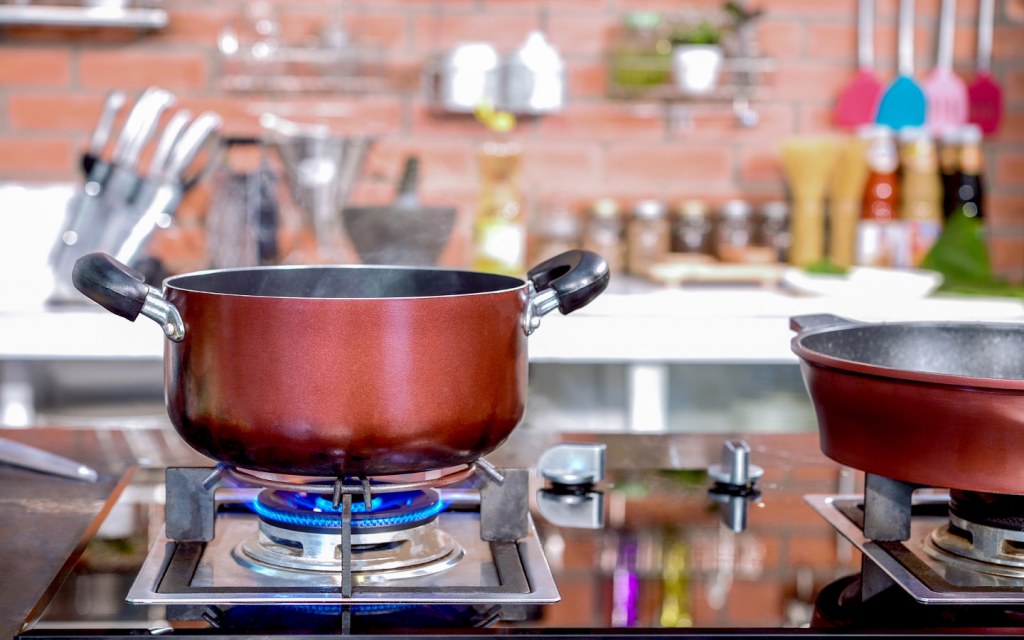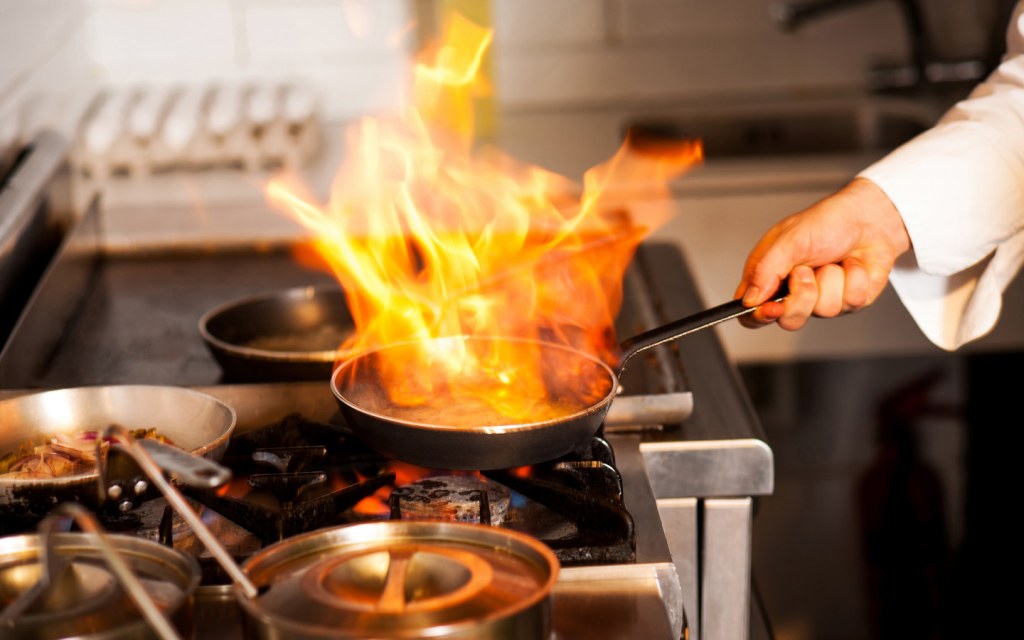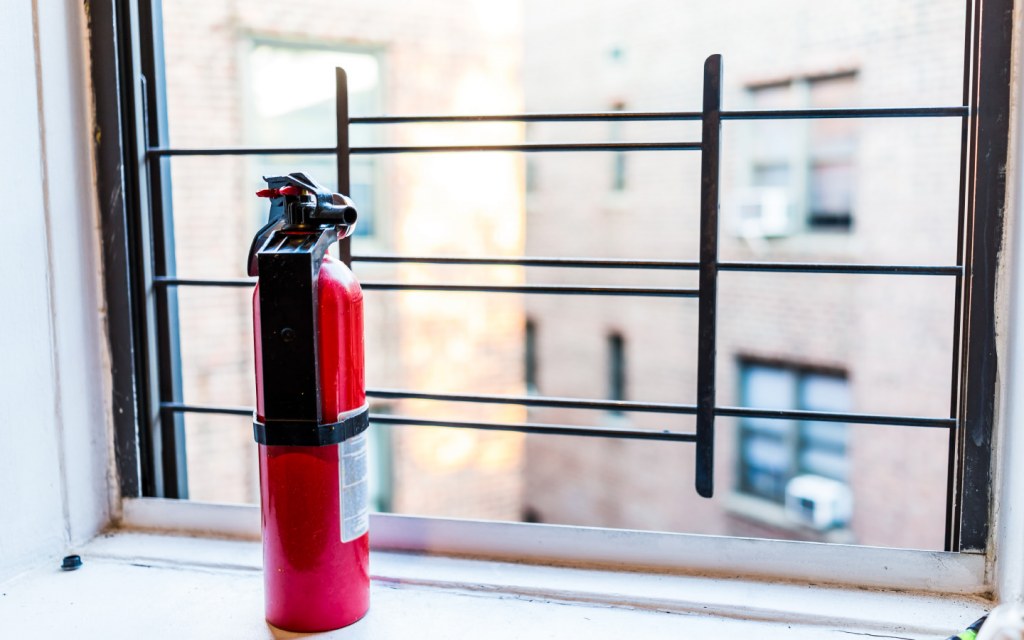A moment of distraction while cooking can result in a grease fire, which can set your kitchen and subsequently your home ablaze within a few minutes if not controlled immediately.
Imagine you’re just heating up the oil to deep fry some frozen snacks when your phone suddenly rings. It’s a very plausible scenario where you proceed to attend the call while waiting for the cooking oil to reach the desired temperature.
This can be dangerous.
Grease fires start when oil or any other kind of fat becomes too hot and reach its smoking point. There’s usually a 30-second window between the moment wisps of smoke begin to rise from the pan and when the oil actually catches fire.
Since these accidents can be deadly, here are a few tips and suggestions on how to respond to a kitchen fire and what not to do if something like this actually takes place.
How to prevent grease fires

As we have all heard multiple times, prevention is better than cure. Since grease fires are completely preventable, here are a few ways to ensure you don’t set your house aflame while cooking.
1. Don’t leave the oil unattended
Once you’ve turned on the stove, do not leave the kitchen under any circumstance. Most cooking oils tend to reach their smoking point rather quickly, so it’s really important to be present in the room when the pan begins to get hot. It is recommended to use a food thermometer and check if the grease has reached the recommended temperature before placing vegetables, meat or any other product in it.
2. Keep an eye on the flame
You also need to pay attention to the flame and turn off the burner as soon as you notice smoke or an acrid smell filling the kitchen. It is also important to heat oil slowly on a low flame to avoid any unfortunate grease fires. Granted, grease or fat doesn’t immediately catch fire, but the high flame might exacerbate the situation.
In fact, if the flame is too high, the oil might catch fire even before getting too hot.
3. Avoid placing frozen food into hot grease
Make sure to remove as much moisture as possible from food and practice extreme caution while putting it in the oil. Instead of using your hands, use tongs or forks to place food in the sizzling pan so that you don’t splatter hot grease everywhere including your skin, which can leave severe burn marks.
Some items, such as frozen meat and eggs, will make the oil pop once they make contact with the hot pan, so you need to maintain some distance from the stovetop while cooking them.
4. Keep flammable items at a distance
Never keep your oven mitts, paper towels and wooden utensils too close to the stove, especially when you are heating something as flammable as oil. You can prevent grease fires from spreading by moving combustible objects away from the stove.
5. Be extra careful with deep fryers
Deep fryers need to be handled with a lot of care. Firstly, you need to make sure it’s placed properly on the stovetop and is in no danger of tipping over. Secondly, be careful while putting in and taking out food from the fryer so you don’t end up getting burned.
Since deep fryers can hold large amounts of oil as compared to regular pots and pans, they are also much more likely to start a kitchen fire and set everything ablaze.
What not to do

Do not panic if your saucepan suddenly catches fire. Although it’s easier said than done, you need to remain calm and think of the best possible ways to put out flames before they engulf your entire kitchen.
Let’s take a look at some of the things you absolutely should NOT do in case of a grease fire.
1. Do not use water or any other liquid
In some cases, water is the last thing you should use to put out a kitchen fire. In case of a grease fire, using water, soda or any other liquid can make it even worse.
If you try to douse the flames with water, the hot grease will instantly vaporize it and turn it into a burst of steam, which can burn you or anyone standing close to the stove. It would also make it even harder to put out the fire.
2. Don’t move the pot or take it outside
Our hands tend to shake when we are nervous or scared, which is why carrying a burning pot outside the kitchen can be disastrous. It’s understandable that you would want to move the flaming pot away from the wooden cabinets in your kitchen, but accidentally dropping it on the floor can instantly set your house on fire. Not to mention, you can get injured even if you spill even a little oil on yourself.
3. Don’t throw flour or baking powder on the fire
While baking soda can help put out a small grease fire, you cannot use baking powder or another baking product as its substitute. The same goes for flour, which not only has a lighter weight but is also flammable. So, unless you want the fire to get completely out of hand, keep these products as far away from the stove as possible.
4. Don’t fan the fire
Any kind of cloth or paper can easily catch fire if it gets too close to the flame. Therefore, trying to fan a grease fire with a piece of towel or any other fabric can potentially spread it onto other parts of the kitchen. There is also the possibility of you splashing some grease on yourself if you get too close to it.
5. Don’t use anything glass or plastic
Since fire cannot burn without oxygen, one of the best ways to contain it is by covering it. However, using a glass lid or one made out of plastic would not help. Actually, the glass might shatter due to heat, which could be extremely dangerous for everyone standing in the vicinity. Meanwhile, plastic would simply burn and melt.
How to put out a grease fire

Now that we have discussed the things you should avoid doing in case of a grease fire, here are some tips on how to put it out.
1. Turn the heat off
Needless to say, make sure to turn off the burner as soon as the oil catches fire. If you respond to a kitchen fire quickly, there is a good chance it would diminish on its own. However, if you don’t turn off the burner immediately, the fire can spread to nearby wooden cabinets and other flammable objects.
2. Cover the pot with a metal lid
Make it a habit to keep a metal lid close by whenever you are cooking something in the kitchen. As discussed above, covering the pot fire with a glass or a plastic lid may be essentially useless, but a metal lid can effectively put out a kitchen fire by cutting the oxygen supply inside the burning utensil without shattering into pieces or melting away.
3. Pour on baking soda or salt
In case of a small fire, you can throw baking soda onto the hot grease to smother flames. However, if the fire isn’t exactly small, dumping a large amount of salt on grease fire would do the trick. Of course, you can only do this if you are able to reach the container of salt. If the flames are too high, don’t risk yourself trying to grab it and instead do one of the following things.
4. Spray it with a fire extinguisher
Invest in a Class K kitchen fire extinguisher and store it somewhere that is easily accessible by all members of the family. Ideally, you should place it near the exit that is closest to the kitchen, which is where most house fires start.
Once you purchase an extinguisher, carefully read the instructions printed on the label so that you would at least know how to use it in case of an emergency.
5. Call the fire department
If you think the fire is getting out of control and you are unable to put it out, don’t waste time standing in the kitchen. Immediately get everyone out of the house and alert the fire department by dialling 16 from your phone.



